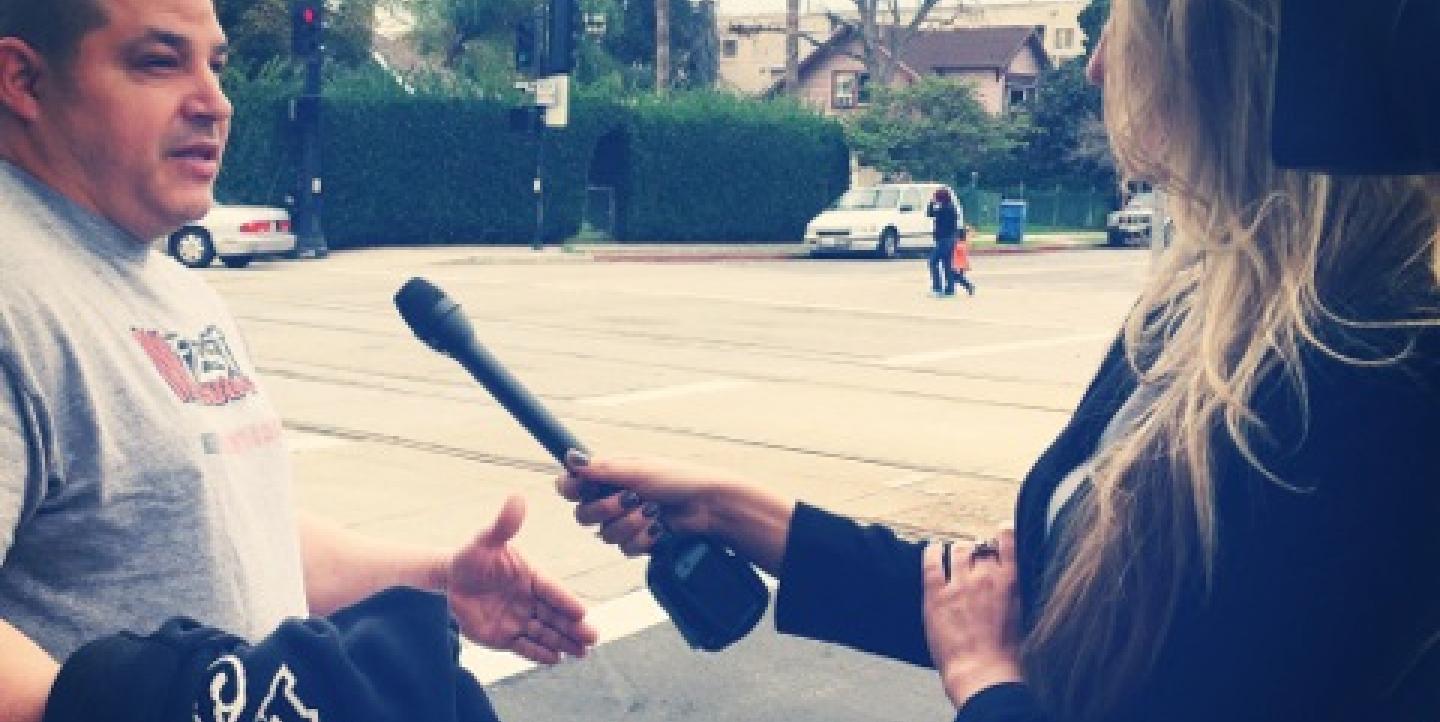When news reporter Stephanie Tsoflias and her videographer Kenton Young were teaching an "Intro to TV News" course in New York, their students voiced a major concern: they had all graduated from great journalism schools but felt like their programs sent them off without a demo reel fit to land them a job.
Instead of taking an unpaid internship after college to beef up their material, they either 1) got out of the business or 2) took an 'off camera' job hoping they'd find their way on the air. So Tsoflias and Young offered to shoot their demos for them. This is how they came up with the concept for Reel Reporting, an organization that offers workshops to help job-searching broadcast journalists shoot their resume reels.
"We didn't let them shoot just any stories," Tsoflias said. "Learning a thing or two from years of pitching our own stories in editorial meetings, we knew that the stories had to be compelling, visually interesting and something different. No fire stories, no crime stories, no fake live shots or headlines."
Soon after, their first student got a job, and more students followed, landing on-air jobs with the reels they created for them. They've started offering workshops around the U.S., which feature expertise from an on-air reporter in the local market and a news videographer.
Tsoflias shares a few tips for broadcast journalists to keep in mind when shooting their own resume reels:
1. Montages should include approximately four stand ups - not 10. Oftentimes reporters, at all stages of their career, will overdo it. In this case, less is more. News directors would rather see four compelling, interactive stand ups or live-shots rather than a string of run-on clips. Don't make the mistake of losing your audience before they get to the real stories.
2. The average amount of time a news director spends on a reel before moving on is :10 seconds. This is information we've learned from news directors and agents alike. They have hundreds of tapes (or links) to view. They need to see that so-called 'it' factor right off the top. Put your best footage first. That doesn't necessarily mean the clip where you look your best. Consider your look, what you're saying and what you're doing.
3. News directors pay attention to writing; it's not just about looks. Writing is the foundation of this business, especially in the digital age where you have to write your broadcast scripts AND web scripts. When writing your stories, go for the heart. Find a way to engage the viewer.
4. Find stories that you don't see on TV. When you walk into a new newsroom, there is one guarenteed way to impress your new employer - pitch an enterprised piece. That's what they want. Assignment editors constantly have their eyes on the news wires, scanners and newspapers. As a reporter, your job is to dig up stories. Your reel should reflect your ability to find stories no one else has.
5. Anchoring will not get you your first job. Neither will your college reel. People often want to be 'on an anchor desk' and 'read copy' as part of their demo. We always steer them away from those clips. If you're applying for your first job on-air, anchor clips will not get you the job. Your reporting will. Ask any hiring manager or anchor out there -- behind any good anchor is a great reporter.
6. You need to be active on social media - it's a must. Being present on social media among all platforms shows stations that you are engaging audiences. The more you engage, the more people will watch.
7. Two packages will do. Agents and schools will often tell you to put three packages on your reel. It's been the standard for years. We've found that news directors say two is enough. Just make sure they are different in tone and style.
8. Don't get an agent before you get a job. You want to get your feet wet. It's unlikely agents will bring you on before you land your first job. That being said, some do see potential early and want to guide you from the start. Our advice wouldn't be to go after the agent. Go after the job, the agent will come.
Reporting Reel's next Demo Reel Intensive workshops will be held in South Florida, March 20-22, and New York City, March 27-29. For more information, contact Stephanie at reelreporting (at) gmail (dot) com.
Stephanie founded Reel Reporting in 2013. She spends her days in the field covering compelling reports for News 12 Long Island and PIX-11 News, in the biggest media market in the world, New York. She has also covered such recent major news events as Hurricanes Sandy, for which she won an Emmy. Combining on-air reporting and teaching, Stephanie is regular instructor at Media Bistro. She maintains a personal blog that has been featured in the Huffington Post, The Knot and MSN and been a guest speaker at Syracuse University and University of Maryland.
Image of shoot in LA courtesy of Tsoflias

